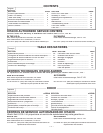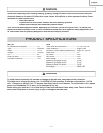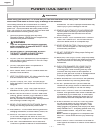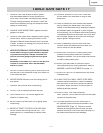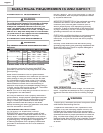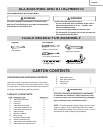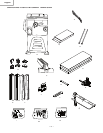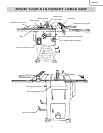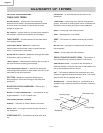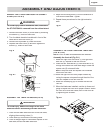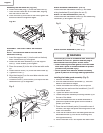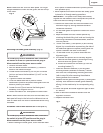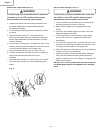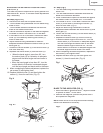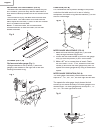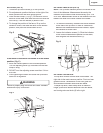
–
10
–
English
HITACHI PROFESSIONAL
TABLE
SAW TERMS
MITER GAUGE –
A guide used for crosscutting
operations that slides in the tabletop channels located
on either side of the blade. It helps make accurate
straight or angle cuts.
RIP FENCE –
A guide used for rip cutting that clamps to
the tabletop. It allows the workpiece to be straight.
TABLE INSERT –
Provides access to the blade arbor
for changing blades.
OVERLOAD RESET SWITCH –
Resets the
thermocouple and provides a way to restart the saw
motor if it overheats or overloads.
BLADE BEVEL SCALE –
Measures the angle the blade
is tilted when set for a bevel cut.
TABLE SCALE –
Measures the distance the rip fence is
set from the blade, allowing quick setups.
ANTI-KICKBACK PAWLS –
Prevents the workpiece
from being kicked upward or back toward the front of the
table saw by the spinning blade.
SPLITTER –
Keeps the workpiece spread apart
after being cut, to prevent binding on the blade and
workpiece.
BLADE ELEVATION HANDWHEEL –
Raises and
lowers the blade.
BLADE TILTING HANDWHEEL –
Tilts the blade to any
angle between 0° to 45° for bevel cuts.
WOODWORKING TERMS
ARBOR –
The shaft on which a blade is mounted.
BEVEL CUT –
An angle cut made through the face of
the workpiece.
COMPOUND CUT –
A simultaneous bevel and miter
cut.
GLOSSARY OF TERMS
CROSSCUT –
A cut made across the width of the
workpiece.
FREEHAND –
Performing a cut without using a fence
(guide), hold down or other proper device to prevent the
workpiece from twisting during the cutting operation.
GUM –
A sticky sap from wood products.
HEEL –
Misalignment of the blade.
KERF –
The amount of material removed by a blade
cut.
MITER CUT –
An angle cut made across the width of
the workpiece.
RESIN –
A sticky sap that has hardened.
REVOLUTIONS PER MINUTE (RPM) –
The number of
turns completed by a spinning object in one minute.
SAW BLADE PATH –
The area of the workpiece or
table top directly in line with the travel of the blade or the
part of the workpiece that will be cut.
SET –
The distance between two saw blade tips, bent
outward in opposite directions to each other. The further
apart the tips are, the greater the set.
WORKPIECE –
The item being cut. The surfaces of a
workpiece are commonly referred to as faces, ends and
edges.
Leading Edge
Kerf
Surface
Saw Blade Path
Trailing Edge
Workpiece



